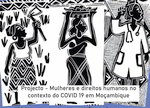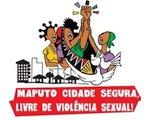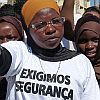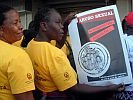Economic Corporations and Expropriation: The case of girls, women and resettled communities in Moatize district
Book Summary
Authors:
Conceição Osório
Teresa Cruz e Silva
Download this summary as a PDF document ![]()
Maputo, 2017
Introduction
In 2016, in partnership with the European Union, WLSA Moçambique conducted a study entitled: Corporações Económicas e expropriação: raparigas, mulheres e comunidades reassentadas no distrito de Moatize (Economic Corporations and Expropriation: the case of girls, women and resettled communities in Moatize district that assesses the impact of the mining industry on communities in Moatize district, in particular the populations affected by the establishment of the Vale and ICVL companies.
The results of the research are part of a broader programme carried out in collaboration with local (Moatize) civil society organisations to train activists advocating the protection and defence of human rights, especially those of women and girls, by applying the law in force. The programme aims to ensure that communities affected by the coal industry have access not only to information but also to knowledge about their rights as citizens, men and women.
In addition to identifying legislation, policies and institutional mechanisms covering the mining industry, the study’s key objectives were recognition of the outcomes of megaprojects as regards the resettlement process and its effect on communities. It focused, on the one hand, on the way power relationships between women and men are organized, as expressed in how women participate in decision-making during the resettlement process and, on the other hand, the effects of the destructuring (and also the reconfiguration) of their social functions in a context of forced displacement.
This means that, although we studied in depth the impacts of the resettlement process on men and women, we focused in particular on the effects of the resettlement process on women and girls, and on their strategies to reverse the situation of exclusion and domination. We are thus trying to understand how the social construct of inequality i.e. access to and control over resources, has been intensified not only through old elements of domination but through the production of new devices that renew power hierarchies.
Although we mention the remaining communities, the observation focused on resettled populations in Cateme, Mualadzi and also the 25 de Setembro neighbourhood. This was because these are the communities where deterritorialisation was felt most severely (especially in Cateme e Mualadzi), with major implications for destructuring identity and exclusion, both material and symbolic.
The methodology was developed around three dimensions: the first was a review of international and national literature on the extractive industry; the second was an analysis of legislation and public policies, focussing on mechanisms governing women’s rights and national provisions guiding mining activity and the resettlement process. The third dimension was semistructured interviews with the women and men affected by resettlement in communities in Cateme, Mualadzi and 25 de Setembro neighbourhood, members of local and central civil society organisations that investigate and work to disseminate legislation and implement women’s empowerment projects, as well as agents in State sectors who work directly with the extractive industry, whether inspecting company activities or defending people’s human rights i.e. health and education.
This report is organized into three large themes, corresponding to the research programme’s objectives:
- Legal provisions adopted in Mozambique and the extent to which they are applied, in particular on laws on mines, the environment and land;
- The resettlement process and mechanisms for including new locations, through the perceptions of communities and their leaderships, economic corporations and the State sectors involved in the forced displacement of populations. This second aspect took into account how compensation and social responsibility programmes have (or have not) contributed to replicating the pre-resettlement living conditions or restoring the social fabric and improving people’s quality of life;
- Configuration of gender relationships and power hierarchies after resettlement and the responses of men and women in the light of the new context.
On legal and institutional provisions in Mozambique
The growing demand for natural resources in the country has dictated the need to produce appropriate legislation able to address the resulting impacts, with direct consequences on social and economic areas. These measures were also part of Government commitments, through the country’s adherence to international and regional provisions on areas such as: mining, environment, sustainable development and gender equity. Consequently, between the 1990s and the 2000s existing laws were updated or new devices were produced to regulate these areas of work.
Constitution of the Republic
The Constitution of the Republic establishes the rights of citizens and their equality before the law (article 35), emphasizing the equality of men and women (article 36); it specifically defends the right to compensation whenever fundamental rights have been violated (article 58).
The Constitution of the Republic recognizes and protects rights acquired through inheritance when it expressly states in article 111 that “as regards holding a title to use and benefit from land, the State recognizes and protects rights acquired through inheritance or occupation except when there is a legal reserve or if the land has been legally attributed to another person or entity”. Similarly, and in keeping with our work, the Constitution of the Republic also determines that the “State adopts policies on preventing and controlling pollution and erosion; includes environmental objectives in sector policies; guarantees the rational use of natural resources while safeguarding that capacity for renewal, ecological stability and the rights of future generations; promotes the spatial planning of the land with a view to a correct location of activities and balanced socio-economic developments”.
It is thus clear that, when applying specific laws, it is a violation of the Constitution of the Republic, both as regards equal rights between women and men, and also in restitution and compensation for communities for the expropriation of their goods and way of life, as well as safeguarding the environment.
The National Policy on Land and the Land Law
The National Policy on Land (paragraphs 34 to 41 of Resolution 10/95 of 17 October) establishes some principles that guide mining activity:
“34. Mineral resources and hydrocarbons are the property of the State, which is responsible for determining the conditions for the use and benefit while safeguarding national interests, irrespective of who holds the title to the land”.
“35. The right to exploit mineral resources and hydrocarbons is distinct and independent of the right to use and benefit from land”;
“39. Whenever there is a conflict between mining activity and other uses and occupation, the former has preference subject to fair compensation for any losses or damage caused”.
“41. The exploitation of hydrocarbons is considered an activity of strategic national interest and prevails over other land use activities”.
If the National Policy on Land shuns the use and occupation of land in favour of mining, and thereby legitimises expropriation, it also says that the State owns mineral resources and is responsible for safeguarding its own interests and those of its male and female citizens.
The issue that arises, and that is laid down in Land Law 19/97, is that revoking the right to use land in the name of public interest is preceded by the payment of fair compensation, emphasizing the right of communities to information, a hearing and negotiation.
The study’s findings have clearly shown that communities’ rights have been violated, in both the consultation process and the expropriation and forced displacement of the affected populations. This not only means a gross breach of the law by mining companies but the State’s abdication of its responsibility to protect and defend the rights of communities and, at times, even the transfer the State sovereignty to the companies.
National Policy on the Environment and the Environment Law
By Resolution 5/95 of 3 August the Council of Ministers approved the National Policy on the Environment, published in the Government Gazette on 6 December 1995 (1st Series, nº 49). The “preamble” to the Resolution refers to the Constitution, the right of citizens to “a balanced environment and the duty to protect it”, assigning to the State the task of achieving this through initiatives aimed at “ecological balance and the conservation and preservation of nature”.
In particular, the National Policy on the Environment establishes the following principles: Man as the main beneficiary of its appropriate management; optimising the use of natural resources; the polluter’s obligation to restore the environment; income from the rational use of the environment must benefit local communities; public participation in decisions taken on environmental impacts is guaranteed; valuing local knowledge about environmental management.
The National Policy on the Environment also envisages the need for legislation appropriate to the context in which it was drafted. Environmental education, training professionals and environmental monitoring are some of the National Policy’s directives.
The directives on the environment embodied in Resolution 5/95 recognize “a woman’s direct dependence on natural resources because of her responsibility for the family’s livelihood”, paying special attention to her “ambiguous” role as both agent and victim of her action, recommending her integration into natural resource management and environmental education programmes and others that give her equality of opportunity. A special place is also given to the community of which the woman is an integral part so that it benefits from existing programs, encourages local knowledge on nature conservation and manages and monitors the environment.
In response to the directives of the National Policy on the Environment, and in accordance with the 1990 Constitution, Law 20/97 of 1 October lays the foundations for environmental prevention and protection in the country. The principles set out in the National Policy are embodied in the Law. Article 4 of the General Provisions, establishing fundamental principles, highlights among others, the principle of “caution, such that management of the environment must give priority to establishing systems that prevent acts harmful to the environment, in order to avoid negative environmental impacts (…)”, and also specifies equal opportunities between men and women in access to and the use of natural resources.
As regards pollution of the environment, Article 9 prohibits “the production, depositing in the soil or subsoil, release into water or the atmosphere, of any toxic and polluting substances (…}”. Yet the research results revealed a clear violation of this law as we shall see throughout this text.
The right to information, education and justice laid down in Chapter VI of this Law (articles 19, 20 and 21 respectively), not only advocates measures to protect the environment but also the rights of citizens who have been harmed by third parties due to violation of environmental law. Articles 21 and 22 in particular refer explicitly to the right to access to justice, namely, the right to request the suspension of the activities causing damage.
The Attorney General’s Office has competence to defend environmental rights and the Government has competence to regulate and inspect observance of the law as well as promoting the creation of local inspection agents.
Decree 26/2004 of 20 August approved the Environment Regulations for Mining Activity, creating a Consultative Council comprising a group indicated by the minister responsible for environmental affairs and the minister responsible for mineral resources. The two ministries are responsible for, ensuring the approval of plans on environmental management and control, approving environmental impact study programmes, diagnosing damage to the environment (especially through environmental audits) and taking corrective measures (articles 1, 3 e 4). In order to make monitoring and evaluation more effective, a multi sector approach was established and reflected in the composition of the Consultative Council.
As regards sanctions for failing to comply with the law, “the regulations subject the guilty party to penalties laid down in the Mines Law, Environment Law and their respective regulations” (Chapter VI, Sundry Provisions, article 26).
However, during the research it was found that, in addition to there being no local inspection agents, rivers and water are polluted, and toxic products are being released into the air, potentially causing pulmonary diseases. Moreover, denunciations of air and water pollution by the population, as in Ortiz town where opencast explosions are poisoning the land and water, and in Mualadzi village where laboratory analysis has shown the poor quality of drinking water, have not resulted in the State taking measures, i.e. the penalties foreseen by law.
Mines Law
In our analysis of the Mines Law (Law 20/2014) we highlight three dimensions: the first is community rights, the second is the duties of the State and concessionaires and the third is the sanctions foreseen for not obeying the law. In order to guarantee community rights, Chapter I, General Provisions, paragraph 2 of article 12 on land use and benefit expressly states that “pre-existing land use and benefit rights are considered extinct following payment of fair compensation for users of the land and revocation of the same in accordance with applicable legislation”. Also with regard to compensation, Chapter II on Pre-existing Rights, article 30 (fair compensation) states in its paragraph 1:
“When the concession area available covers, partially or completely, spaces occupied by families or communities and implies their resettlement, the company must compensate those concerned fairly and transparently in a manner to be regulated by the Government”.
Paragraph 2 of the same article states that in order to achieve fair compensation there must be a memorandum of understanding between the Government, companies and communities.
However, there is clear ambiguity in the Mines Law when article 31, lines a), b) and c) it states that fair compensation covers a) “resettlement in decent housing by the holder of the concession, in better conditions than before”; b) “payment for the value of improvements made under the Land Law and other applicable legislation”; c) “support for the development of activities on which the life and food and nutrition security of those concerned depends”. This issue, raised on various occasions by researchers and CSOs, leaves open if what the law considers fair compensation does not fit effectively the compensation due for the expropriation of communities.
Reinforcing the duties of title holders with regard to the rights of communities, article 41 on the specific rights of the titleholder (Chapter II Legal Regime for Mining Title Holders) stipulates that, in cases of damage to the land caused by mining activities, users of the land must be compensated (line g) and also the company’s duty to do environmental restoration and repair damage arising from prospecting and surveying. However, communities who remain are suffering directly from the effects of activities during the prospecting phase, without the law being applied.
The research revealed that the housing, already the object of protest demonstrations in Cateme and in 25 de Setembro neighbourhood, continue to have problems with cracks and water infiltration. There was also evidence that the income generation programmes, such as keeping chickens and support for starting new fields, as well as the “offer” of a basic food basket, either did not produce the desired effect or the support was interrupted by the companies.
In the law’s General Provisions, Article 13 (line g) on the Government’s Competencies states that the Government has the responsibility “to protect communities where mining activities are authorised, and promote socioeconomic development for the well-being of the same”. If we consider the situation of both the resettled communities and the communities still remaining we find that their economic situation is showing signs of alarming poverty, for example, people who have already died of hunger and others who are living with serious difficulties. In addition to the lack of employment, the contamination of water and/or its limited availability, the lack of transport, land that is not very productive lead to the conclusion that the communities are not being protected and that the Government is not fulfilling its role.
Number 1 of article 2 states that “a percentage of the revenue generated for the State by mining is channelled for the development of communities in the areas where the respective mining activities are taking place”. However, the 2.75% tax on production that should be channelled to communities affected by the mining industry is currently going to Moatize district, not just to the affected populations.[1]
One of the most important questions affecting communities and CSOs is lack of information about the rights of the parties involved in mining. Paragraph 1 of Article 32 on community involvement (Chapter on Pre-existing Rights) states that “communities must be informed in advance about the start of prospecting and survey activities and also the need for their temporary resettlement for this purpose”. Paragraphs 2, 3 and 4 of the same article make community consultation mandatory in mining ventures, creating mechanisms for involving them and organising them. However, based on accounts recorded during the research, it is clear that communities either were not involved or were, but insufficiently, as the information process was replaced by communication. In other words, although there was a series of meetings between communities, companies and Government, in reality the removal of communities was considered to have been agreed. Another example showing that involving people is not a priority for the companies, is the fact that the employability of people in affected communities by the companies, foreseen in article 36 of the Mines Law, has not been achieved.
Moreover, although failure to comply with environmental norms and damage to the environment are some of the issues that can result in a mining license being cancelled, the instruments established by law (at the time of the research) had not been used, as shown by the reports on water contamination.
As regards women’s rights and the specific characteristics of their action in the family survival context, and unlike the Land Law and the Environment Law as well as national policies guiding the two sectors, as indicated, there is no special mention of women, not even when referring to the rights and duties of communities and restoring the environment.
Legal provisions for resettlement of the population
Regulations on the Resettlement Process Arising from Economic Activities (Decree 31/2012 of 8 August) and the Technical Directive on the Process and Implementation of Resettlement Plans (Ministerial Diploma 156/2014 of 19 September), are instruments that regulate the movement of people and their rights in the expropriation process.
The Regulations on the Resettlement Process stipulate as principles (Chapter I, General Provisions, article 4), among others, “social cohesion – resettlement must guarantee the social integration and restore the level of life of those affected to a better level”; “social equality – in the resettlement process all those affected have the right to the restoration or the creation of conditions equal to or better than their previous living standard”; “no change in income level”, and the principle of “public participation – the resettlement process must guarantee that local communities and other parties interested in and affected by the activity are heard” (Article 4, lines a, e and f). In this provision, which also establishes the responsibility of each State sector, we would draw attention to article 12 on the responsibilities of the public works sector in “guiding and accompanying the establishment of infrastructure, namely, access, water supply, electricity, sanitation (…)” and the agriculture sector that must guide, ensure and inspect the resettlement implementation process. This mechanism also stresses the obligation to hold public consultations (article 23) and inspection by the Environment Inspectorate. Article 16 on resettlement models states that the resettlement process is accompanied by the establishment of roads, water supply systems, sanitation, electrification, health post, school, kindergarten, market, shops, police post, places for recreational, sport , worship and meetings.
The research showed that in addition to insufficient execution, as can be seen in the case of sanitation, water supply and electrification, among others, not all communities have the items listed in this provision, such as shops and places for recreation and worship. Moreover, there is infrastructure such as markets the usefulness of which, without doubt, shows how community livelihoods have not been reproduced, i.e. access to land that in their home areas enabled them to sell their crops in the market.
In the field of regulation of mining activity, inspection of compliance is one of the main problems encountered during our research. As the Mozambican State is extremely “fragile” and clientilist in relation to the independence of its institutions i.e. justice, it is the companies that monitor the application of the law. It is they who prepare reports validating observance of the law and this, in our opinion, reveals the State’s exposure to the multinationals’ interests. For example, the law states that the State must prepare periodic reports on environmental impact, but in reality they are produced by the mining companies without State verification. When questioned about river pollution and explosions in areas where communities that have not been resettled are still living, the authorities claim, and we quote one provincial leader: “It is the mining companies that have measurement equipment and we are confident about what these companies prove”.[2]
This malaise, proof of the fragility of State sectors, was clear in interviews with senior officials in provincial directorates, who were either rather aggressive when asked about explosions in Moatize district or blamed the central ministries for non-observance of the law. In the first instance they say “there must be proof of pollution, it isn’t enough to just say so”, and in the second instance they referred to the payment of taxes, the 2.75% of revenue generated by mining.
In an attempt to overcome some of the shortcomings of the industrial sector, Resolution 23/2016 of 13 September approved the Industrial Policy and Strategy for the period 2016/2019.
In the definition of the eight pillars of the strategy for industry, we highlight of particular importance for the mining industry (that the Resolution considers a priority industry, and also considering the shortcomings identified in interviews with specialists in the field): (i) Infrastructure for Economic Development; (ii) Human Capital Development; (iii) Definition of an Appropriate Institutional Model for Promoting Industrial Development.
The objective of the Infrastructure for Economic Development pillar is “to ensure the existence of infrastructure so that industrial projects are viable”. It proposes, among others, consolidation of the development corridor or strategy in an articulated and integrated manner with other projects implemented in these corridors.
Given the lack of qualified workers for the coal mining industry, highlighted in many of the above mentioned studies, Pillar Two (Human Capital Development) establishes a programme, Consolidation of Vocational Education Reform, Creation of the Attraction Fund and Training and Guiding Talents. The objective is, on the one hand, Human Capital Development for the industrial sector and research, and also to address in the short and medium-term the need for qualified workers able to handle the technological challenges created by industry. On the other hand, it also mentions training and attracting cadres to the State sector to accompany, monitor and stimulate industrial development.
Pillar Eight, Definition of an Appropriate Institutional Model for Industrial Development, responds to a structural problem that has been debated over the years: the need to introduce effective multisector articulation that addresses a set of variables and permits knowledge and coordination of the industrial sector, through the Creation of Platforms for Multi-sector Coordination and Government-Private Sector Coordination for Industrial Development and permits the articulation of strategic actions at all levels.
Despite being somewhat better than Resolution 38/2007 of 18 December on Industrial Policy and Strategy (Política e Estratégia Industrial – PEI 2007), nevertheless, the new Industrial Development Policy and Strategy, especially in the case of human capital development, ignores prioritization in the training and integration of girls and women in strategic sectors of the economy.
Along the same lines, given its “gender insensitivity” legislation on the mining industry in Mozambique leaves various doors open for perpetuating this inequality. Despite expressing a concern about the inclusion of women, the provisions on related matters (land and environment) and directly related to this law, as already noted, do not resolve the real situation of the impacts of mining and contribute to the perpetuation of social injustice.
The assessment of the direct and indirect impacts stemming from the production of mine–energy products cannot be dissociated from the provisions we have just mentioned, given the interaction they all have with the social and economic rights covered by this study, for the assessments of women’s human rights, particularly those living in resettlement areas in Moatize district, Tete province.
An analysis of the legislation produced in the country and ratified by it reveals some progress. Nevertheless, its application is flawed as regards the inspection and regulation that is essential for evaluating and monitoring compliance with the law, in particular the weak or non-existent involvement of communities in taking decisions on their lives. The Regulations on the Resettlement Process Arising from Economic Activities (Decree 31/2012 of 8 August) provides a good illustration of this situation. The study was able to identify a number of failings in the application of this provision to the obligations of companies and the State.
In addition, the law’s focus on the mechanisms guiding the resettlement process, does not take into account the specificities of the social construct of male and female identities, nor the differentiation in the division of labour and access to rights. This situation results in the deterioration of women’s lives, both their economic autonomy (achieved to some extent in their home areas), and access to and defence of their rights, as in the case of the possibility of reporting domestic violence in resettlement areas where the “Gabinetes de Atendimento da Família e Menores” (Offices for Assistance to the Family and Minors) have not yet been created.
Consequently, in the case of legislation, it was found that the process of establishing the extractive industry in our country has been accompanied by the preparation of provisions that seek, albeit partially, to address the challenges presented by the expropriation of lands and the forced displacement of populations living in areas affected by mining.
The resettlement process: consultations, impact and narratives
Our study sought to identify the impacts of mining on communities in Cateme, Mualadzi and 25 de Setembro neighbourhood where 726 families, 478 families and 289 families respectively have been resettled. Although not our objective, we also took into account the situation of the 181 remaining families still living in Capanga and awaiting resettlement.[3]
Resettlement is a process where information and listening to the communities who will be affected are key elements in mobilizing these populations for the change brought about by new circumstances.
The Regulations on the Resettlement Process Arising from Economic Activities (Degree 31/2012 of 8 August) and the Diploma approving the Technical Directive on the Process of Preparing and Implementing Resettlement Plans (Ministerial Diploma 156/2014 of 19 September) establish the right of communities to public consultation. Specifically, the law determines that there must be public participation in all phases of the resettlement process and people must obtain complete information about the objectives, the content and the procedures to be followed for the transfer of people to new areas.
However, people’s accounts do not recognize that there was any consultation, but merely communication on their forced displacement. Restrictions on community participation in the resettlement process are a form of corporate control because, as the participants are controlled by the mining companies, they end up legitimising their strategies of dispossession, with the argument that there was and there is community participation in defining their ways of life. The consensus and the agreements reached on the displacement of communities, stated by the companies and the Government, are nothing more than a device to legitimize the expropriation and concealment of popular demands.
The absence of consultation with populations does not allow them to be the subjects of the action. People are disinherited not only of their land, in the material sense, but also as the place of symbolic belonging. It is important to take into account the symbolic dimension where companies appear as benefactors and also monopolize the discourse (Santos, 2016; Araoz, 2016).
Consequently, the impact of resettlement on the life of communities must be viewed at three levels: the first concerns the relationship between the companies’ promises and people’s expectations; the second concerns the preservation of identity practices and values; and the third refers to the conditions encountered in the new areas and the possibilities of survival.
The replication and/or improvement in the living conditions that people enjoyed in their home areas, the existence of infrastructure and “areas reserved for agriculture and livestock”, are regulated by the above-mentioned legal provisions (Decree 31/2012 of 8 August, article 16, paragraph 7). Similarly the operationalization of the resettlement process, described in the above mentioned Ministerial Diploma, details the elements that must be contained in resettlement plans and their implementation. Execution of the Action Plan foresees, among other measures, the construction of infrastructure, housing, compensation for eventual losses and the “allocation of plots and registration” (article 16). Another relevant element is the monitoring and inspection implementation of the resettlement plan by a multi-sectoral Technical Commission.
However, and although the legal mechanisms for the resettlement process cover important aspects for defending community rights, there must be regulations, differentiating between compensation and indemnity and establishing the prior conditions that must exist before people are transferred and also the deadlines to be observed.
The research found that the resettlement process was activated without creating the conditions that would minimise its impact on the populations. Given that, in most cases, it was implemented by the corporations without or with little State intervention, this allowed fundamental rights to be disrespected.
It should also be pointed out that the resettlement process did not take into account the farming cycle and this meant that many families stopped producing before resettlement or saw their activities interrupted. This could have contributed to the fact that, even today, there are few visible signs of collective and individual belonging in the new spaces, so as to be able to describe the territory’s identity based on what the inhabitants do with it, both symbolically and materially.
Housing was one of the promises that created most expectations among the communities but the reality they encountered has been contested from the very beginning. Although Government is responsible for defining the type of house, construction, as a compensation measure, is the companies’ responsibility. What happened was that, given the Government’s passivity, the minimum inhabitability[4] requirements of the initial construction matrix were not met. Moreover, the spaces that existed in the former dwellings, where people used “informal” separators to create more space and differentiate between functions within the house, were not taken into account,
The same happened with farmland. Initially the company was to provide two hectares (one ploughed and one not) but ended up only providing non-arable land and giving some 119,000 meticais as an indemnity for the other hectare. This situation has made coexistence with people already living there difficult. Even today there is a certain distrust that has made the full integration of new communities even more complex.
As the communities were not involved in the projects created by the companies, such as using fertilizer and keeping chickens, they were not accepted. This happens when, following the conclusion of one year of direct company support, only a small number of families continued with the activities. Moreover, as there was no transport it was difficult for families to get to Moatize to sell their chickens.
The issues that are still a source of contention articulate the case of unproductive land with the lack of water and transport and also the implementation of income generation programmes, which the people feel are not feasible. These problems, as we have mentioned repeatedly throughout the report, are to a large extent due to not involving communities in resettlement, the expropriation process and the deterritorialisation to which they were subjected.
Given this deterritorialisation of communities, the companies are only concerned about fulfilling regulatory formalities. There is no strategy that goes beyond good governance and is concerned to improve the overall well-being of people. In addition, there is the breakdown of families and the problems of social cohesion that this entails. As a man in 25 de Setembro neighbourhood told us, “They arrived in Chipanga and I was living in the same yard as my father and my mother. But as I was working I came here and my parents went to Cateme.
One recurring issue in the resettlement spaces where we worked is that so far there is no DUAT, Title to Use and Benefit from the Land (Direito de Uso e Aproveitamento da Terra – DUAT) or other titles, including house ownership.[5] This situation is all the more serious because it was recognized during the resettlement process that people used to live on and farm land that came to them from their ancestors. The impact of expropriation is aggravated in the communities still remaining, as they are affected by the enormous pollution and are prevented from building new infrastructure or improving their houses. This process has been dragging on since 2011.
The legitimisation of land appropriation by the economic corporations in the name of State interest leads to the legitimization of expropriation, even when there are legal provisions governing this expropriation. Along the same lines, from the very beginning the State’s right to displace populations appears not only with a demoralizing character in the people’s fight, but also a factor that limits the possibility and the desire for inclusion.
As Santos says (2016) there is economic expropriation of the reproduction of life and livelihoods, forcing people to develop other activities (given the pollution of the rivers and the unproductive lands), and in reality this leads to an amputation of community identity where the most elementary freedoms are restricted. Similarly, Godfrid (2016) says that one of the characteristics of extractivism is the scale of the intervention of control of communities. For example, the destructuring of livestock keeping and farming, while at the same time they tried to convince people that the only solution for their survival is mining. This is the context that brings into question the very concept of resettlement based on the principle that people want to be ruralised. As one member of civil society in Moatize told us:
“Even though they farmed many were no longer peasants, but with the new reality we must think that these people can be proletarianised. The issue is that people are not interested in just farming. Moreover, people had rights over that land that, which was theirs materially and spiritually and now they feel they are ruined”.(Tete Economic Development Agency)
One of the most visible consequences of the poor resettlement process was that it caused a profound depression within communities far from their ancestral lands, and imposed on them survival practices (that they didn’t have before). This produces a sense of exclusion (also of self-exclusion) and is one of the reasons for people’s resistance to the income generation projects that the companies wanted to implement and that they consider to be their social responsibility.
Company social responsibility: ambiguity between compensation and corporate responsibility
By law, economic corporations must undertake not only to compensate displaced communities for the losses arising from their transfer, so that they can replicate their living conditions, but also to add quality to the new spaces created by displacement. This means enabling the integration of new communities by implementing strategies that give people the possibility of being the subjects of their lives i.e. of intervening through participation and negotiation in the construction of the new territory. In this context, the company should not impose norms that regulate the inclusion of people, or take decisions on what they define as social responsibility, but stimulate community intervention in the design and development of actions.
According to Selemane, the social responsibility strategy should be viewed at two levels (internal and external): “at the internal level, covering the relationship between the employer and the external collaborators in their various forms; and at the external level the company’s actions to benefit the society of which it is part. A socially responsible company is one that reconciles the two ESR (Enterprise Social Responsibility) levels. The internal and external ESRs are like two sides of the same coin”(Selemane, 2008:7). This would mean an integral approach to the role of companies as obliged to develop programs that, on the one hand, enable them to benefit the socioeconomic development of the region, promoting the appearance and sustainability of local entrepreneurs and, on the other hand, to contribute directly to improving people’s conditions and quality of life, considering their well-being in the light of variables that involve not just access to more resources, but in a broader sense, with protection of the environment and the principle of participation in decisions.
Although it lacks regulation, compensation is clarified in the principles expressed in the Regulations on the “Processo de Reassentamento Resultante das Actividades Económicas”( Resettlement Process Arising from Economic Activities) approved by Decree 31/2012. This states that the conditions of people affected by resettlement (article 4, article 10 and article 16) must be replicated or improved. However, article 4 defines the principle of social responsibility as the creation “of infrastructure that promotes learning, recreation, sport, health and culture and other projects of community interest” (article 4, line h). So, if the restoration of living conditions, including income, is in the compensation domain why is infrastructure not also considered in this context, for example, infrastructure for sport and health?
As regards the rights of resettled communities, the “Directiva Técnica do Processo de Elaboração e Implementação dos Planos de Reassentamento” (Technical Directive on the Process for Preparing and Implementing Resettlement Plans) explicitly states that compensation must be contemplated when preparing the resettlement plan and the content of the report on the physical socioeconomic survey, but without being sufficiently explicit about the modalities of its application. Similarly, information on compensation (what it comprises and what are the mechanisms) is extremely insufficient and this can be used by companies of to refuse to take responsibility for rights claimed by communities.
For operational reasons, in this study we consider compensation to be the set of actions intended to replicate the living conditions of expropriated populations. We include in this reading the construction of infrastructure in resettlement areas and income generation programmes.[6] We consider social responsibility to be strategies related to vocational training, employability, promoting entrepreneurs, stimulating the creation of small and medium enterprises that can serve demand (for example, with food and property), the creation of mechanisms for dialogue (transparent) between companies and communities and also actions intended to minimise the environmental impact and promote sustainability.
Now what has happened, for example in the case of local entrepreneurs, is that the falling international coal price has led to a reduction in investments in the extractive industry with direct impacts on the country’s economy and hence the demand for services. This situation has created unemployment and led to the bankruptcy of the hotel and restaurant sector and individuals who resorted to bank credit for investment in rented housing, among other sectors.
Moreover, and in order to stimulate employment and self-employment the mining companies (what can be considered as social responsibility), especially Vale, invested in technical vocational training although neither the employability of trainees nor the number of self-employment activities created is known. What is clear is that vocational training is part of the companies’ strategies in their implantation process, without any prior study of the labour market’s ability to absorb trainees and with training one more legitimizing cosmetic.
It should also be borne in mind that although some 95% of Vale and ICVL workers are Mozambicans we have no information to contradict the fact that most are in unskilled jobs, added to which the workers are not from Tete province. This means there is no strategy to give local communities priority in access to work. As we have already said, only two people from the communities resettled in Mualadzi are working for Vale, although there are references to a not inconsiderable number of young people with vocational training and others with middle level education.[7]
Moreover, less than 10% of workers in mining companies are women and women’s access to technical and vocational training is much less than for men, contrary to the principles of equity and equality.
Returning to the resettlement process, if the compensation required by law was provided in part (such as the construction of schools, health units and houses) it should be noted once again, for example that, some houses are uninhabitable, there are transport difficulties, the lack of regulation on compensation and indemnity processes, the absence of programmes that enable people to continue with their livelihoods that, taken together, make up a violation of the human rights of resettled communities. Also with regard to the legally required compensation, men and women in general were informed that they would enjoy the same living conditions, but without recognising the difference between compensation and the social responsibility of mining companies. One interesting issue that demonstrates how information was incomplete or misunderstood by people is the basic basket that communities were aware should be distributed over a five-year period and not just during the time they were waiting for the results of agricultural activity in the new lands.
This is why promoting the creation of income generation programmes (not just to configure new forms of survival but to transform resettled people into entrepreneurs) did not work. This was because of lack of continued support by the companies, or because people did not feel encouraged, due first to demoralization factors such as poorly built houses, lack of water and transport, and second because they were not involved in decision-making.
Moreover, people’s accounts systematically refer to strong discontent about resettlement and the living conditions they were offered by the companies. They always compare the fact that houses were built, farmland and income generation programmes provided, with the life they had before with fields that were theirs for their use and benefit, the possibility of carrying out other activities such as cutting firewood, selling crops in the market and water, always a common denominator to be found in their discourse.
Poorly built houses, the sensation of temporary, translated in statements emphasizing the lack of titles for houses and fields, contribute to intensifying the feeling of not belonging. The mere situation of an unpredictable future explains, for example, the sale of zinc sheets from the houses and the sale and/or abandonment of their houses.
Compensation and social responsibility are in fact devices of power that seek to legitimise and expropriate. It is a true labour of disidentification to which companies are committed in order to reinforce domination and discourage resistance.
Corporate social responsibility is this intended to produce ways of exploiting people, like the intensification of capitalism’s intervention over territories and bodies. This is also a disidentification process, creating self-representations of blame for the “benefits” implemented by economic corporations.
Exclusion, self-exclusion, resistance and repression
The cycle of community exclusion is articulated through four aspects: (i) institutional fragility and the existence of clientele who legitimate the action of Vale and ICVL; (ii) co-opting community leaderships and repression and/or voiding the people’s demands; (iii) violating human rights, especially those of women, the main people affected by the companies’ actions; (iv) hiring personnel from outside Moatize (even the unskilled) to work in the mines, to the detriment of the resettled populations; (v) the bureaucratization of “social responsibility” and “compensation” and the absence of dialogue with communities since the consultation process.
Even though the Resettlement Plan envisages channels of communication between community and company a set of difficulties has prevented the exchange of information and the establishment of communication mechanisms.
The legislation contemplates mechanisms for articulation between the parties involved in the resettlement process. Ministerial Diploma 155/2014 of 19 September creates the”Comissão Técnica de Acompanhamento e Supervisão do Processo de Reassentamento” (Technical Commission for Accompanying and Supervising the Resettlement Process), directed by the representative of the Territorial Organisation area (article 3). The Provincial Commission for Resettlement and the District Commission for Resettlement, headed by the District Administrator are supporting bodies. In addition to State sectors it has five representatives of the affected population, one civil society representative, three leaders of the affected community, two leaders from the host community and two private sector representatives (article 16, lines d, e, f, g and h).[8] The competence of this body covers, among others, supervising and intervening during the resettlement process, raising community awareness about their rights, receiving complaints from affected populations and informing the competent bodies about them (article 18).
The Mines Law (Law 20/2014 of 18 August) defines the role of the State vis-à-vis the companies, namely, inspection and collecting taxes and fees. The State must protect communities and defend national interests, particularly food and nutrition security and the environment in general.
Natural Resource Management Commissions and/or a Residents’ Commission have been created in resettled communities, as in 25 de Setembro neighbourhood, where some 50% of the members are women. These commissions, which should promote programmes for the population’s socioeconomic development, are in fact the only dynamic bodies where community concerns are heard and communicated. This is due to the ineffectiveness of local leaderships who to a large extent have lost their legitimacy because of the way they behave.
Observation and interviews with resettled communities have shown that articulation between communities and companies and State is very poor.[9] We feel that, although the Resettlement Plan envisages communication channels with the company in fact this has not been very effective because the leaderships either do not communicate community concerns or they are not heard or, also, the local authorities could have been co-opted.
As regards relations with the Government, the civil society organisations and people interviewed in the communities said that the State is unable to respond to community concerns and complaints. The same thing happens with the companies, in a long process of promises with mutual accusations about accountability, postponing ad infinitum the resolution of conflicts (hoping that they will just go away, as in the case of the water pollution issue in Mualadzi). In a clear violation of human rights, both Government and companies just manage the problems as silently as possible so that time will help to deflate people’s claims, or up to the moment when there are new demonstrations which, according to our respondents, are the only ways they can be partially heard.
The information that the Government should produce and disseminate is limited to validating audits by the companies, without inspecting their veracity, making articulation with district authorities and the community more difficult. The fact that the companies are based in Maputo not only facilitates control over the information available but also constrains action by provincial and local authorities, even when that action concerns specific local aspects such as social responsibility. The most common information from companies is about school construction, painting health units and building football pitches, intended to counter community protests and the echo of these protests internally and externally (Selemane, 2015).
There is ambivalence when talking about mechanisms for intra-community communication and with the State. Firstly, this is because there are relations of power and authority within the resettled people that give community leaderships a privileged position, albeit formally, through direct access to and obtaining information from the State and the companies, thereby establishing themselves as community spokespersons. Secondly, there are demanding narratives that exclude any provisions for normative communication, and thirdly there are discourses that emphasize exclusion and self- exclusion, by referring the solution to their problems to some authority or other (that can sometimes be the State, the Frelimo party and at other times the companies).
State sovereignty (particularly its social and defence of the population functions) is being transferred to the companies. The State takes on the de facto role of facilitator in the establishment of economic corporations in the country, and at the same time it produces a discourse of economic and social development for people, articulating ambiguously with a discourse that gives communities responsibility for their own survival. This is a discourse of: “they mustn’t complain, they must produce more”.
Consequently, ignorance of their rights and the various clouds that “mainstream” the resettlement process are integral aspects of exclusion devices, simultaneously seeking to ensure that the situation is maintained and there is conformity, and preventing the expression of resistance. In other words, limiting challenges in bodies for articulation between Government, companies, community and civil society, is intended to create a negative image of those who make demands and speak up. Regarded as “outlaws”, people resist by denying what is “offered”, operating with devices that articulate the exclusion to which they were consigned with self-exclusion. This situation can be explained because when resettled people left Moatize it destabilised their lives completely; they were prevented from reproducing their way of life, burdened by an enormous sense of exclusion. The persistence of problems, for example water (crucial to people’s survival) and the inappropriate solutions adopted by the companies keep people in a situation where they are regarded as disposable by both Government and the economic corporations. One of the most complex situations is disrespecting people’s cultural rights, which goes beyond the failure to comply with compensation, as is happening in Mualadzi, where the remains of dead relatives have still not been transferred and places of worship have not been built.[10]
This situation results in people’s “depression” being expressed in refusal to accept the new locations as theirs; it arouses resistance to adapting new survival strategies, such as income generation projects that are implemented without community involvement in decisions, decisions that are decontextualized from the survival practices that existed prior to resettlement. As a result, people either resist openly, as in the case of the demonstrations in Cateme in January 2012 (repressed with extreme violence) or they do not go along with the companies’ proposals (or do so, but with scepticism).
This reaction illustrates well that they are people who have been denied the right to be the subjects of their lives. This means that the devices of identity nullification used by the powers have an effect that goes beyond the interests of those who expropriate and exclude. Nevertheless, and as we were able to see, civil society organisations have played an important role, particularly in terms of information on some of the communities’ rights, help in formulating their demands, and the introduction of forms of survival and empowerment, such as savings associations
Human Rights of Women: resettlement and the violation of rights
The above mentioned international, regional and national legislation that commits States to mechanisms to protect and defend the human rights of women is indicative of growing maturity in the new political, social, economic and cultural contexts. The appearance of new social movements and the inclusion of new subjects, such as women, leads not only to questioning and renewing democracy and democratic systems, as argued by Touraine, but also the formulation of policies and devices that take into account the structure that organizes unequally access to and the exercise of women’s rights.
Mozambique has a set of instruments on women’s rights of women and gender equality in access to land, like the National Policy on Land and the respective Implementation Strategies approved in 1995 and the 1997 Land Law. They expressly mention women’s right to land, the importance of a woman’s role in producing food and “guaranteeing a woman’s right to access and use land”. However they do not reflect the specific characteristics of the privileged relationship between a woman’s use of land, family and community survival and succession and inheritance. This means that although a woman is the main producer of food, when her partner dies it is her husband’s family (or the woman’s family in some areas north of the Zambezi) who decide who will get to use the land, leaving the woman completely unprotected. In addition, whereas the law foresees that women can hold a land title, they are coerced by the dominant culture and do not use the rights that the law gives them, thereby reinforcing their exposure to poverty and expropriation.
Although the National Policy on the Environment and the Environment Law state that there should be programmes on “natural resource management and environmental education and other programmes to give a woman equality of opportunity” (that the Environment Law reinforces), the research did not find any action by the State to comply with the Environment Policy. It is clearly not enough to talk about equality of opportunity without taking concrete measures to put it into practice, in a context where the social and cultural order is structured around inequality between women and men. If the above-mentioned legal provisions are insufficient (and also require regulations), and still do not take into account the socio-cultural reality, the Mines Law and the mechanisms that specify the conditions for the expropriation of land and community resettlement, ignore completely the consequences of these actions for women’s lives.
Access to and the exercise of the rights of women and men must be analysed in the light of the power relations that structure social order. Through primary socialization in the family (mainly in rural areas but also, albeit more subtly, in urban areas), men and women reveal markers of differentiation in terms of representations and practices “internal” to the habitus that separates, defines and subjects attitudes and behaviours. So if communities have seen their ways of life altered/destroyed by the expropriation process, men and women have been affected unequally by expropriation and resettlement. And this inequality arises from two factors: the first is the continued invisibility of women as subjects of rights i.e. the naturalization of violence against women that comes from the social construct of identities making it possible to hide particular forms of human rights violations. A second factor is related to the position of food provider for families and the inability to continue performing these functions in the new locations, reflected not only in the family’s daily life but also triggering new focal points of violence against her.
Land that is not very productive and lack of water are a constant in the lives of resettled women, causing conflicts that arise, on the one hand, from the women’s frustration at being unable to perform what they consider to be their obligation and, on the other hand, from the continuation of the male roles, expressed in the words of a man who told us: “The woman must go and carry water, how can I as a man go and get water?”
In addition to being unable to reproduce their roles, as inhabitants of Moatize town women also had other activities, such as selling second-hand clothing and charcoal, which gave them relative economic autonomy from their partners. Added to this economic autonomy is the fact that the market, the water source and the river could be spaces for affirmation and contestation, contributing to the construction of new identities and the “escape” from the norms that subjugate them.
Resettlement permits the emergence of new mechanisms of domination. That is, new contexts of human rights violation that affect the entire community. The effects of resettlement on women intensify the culture of female segregation. In other words, if some mechanisms of domination were concealed in their home areas, because there was a sort of “pacification” of gender conflicts, resettlement has triggered more aggressive and primary violations of women’s rights. This is clear when they talk about compensation, better known as the 119 thousand issue. In the focus group in Cateme most women said:
“Our husbands received the 119 thousand and as soon as they did the confusion started. The men spent it as they wanted. Some have 3 wives and one man bought a car with the 119,000 meticais, and today the car no longer exists. There is a lot of domestic violence, I don’t know where the 119 thousand he received went; when I ask he said he spent it on other women and gets very angry with me.”
The discourse on the 119.270 thousand meticais reveals new and open forms of violence against women. As the money was deposited in the name of the heads of the family, without consulting their partners, they spent the money on consumer goods and setting up new relationships, leading to increased domestic violence. This does not necessarily mean that used to share decisions about money with women before. What is important about the new situation is that, given the conditions of most families, the 119 thousand meticais were a lot of money, and this raised women’s expectations of a better quality of life. Moreover, although extra marital relations existed before, polygamy was non-existente as such i.e. they were not considered to be part of or the product of new family links, and could be ignored by partners. This also shows that, for resettled women polygamy was abuse, not only because it took away part of the family income but because it also took away rights. In addition to this situation, resettlement produced a lot of male unemployment, aggravating the survival of families and promoting property.[11]
Nevertheless, there are counter power devices that can show the inculcation of new identity arrangements, such as verbalizing and reporting domestic violence, mainly by younger women, as this account indicates: “I am beaten by my husband, but I want to tell you because when they go to the community court here you have to pay and they beat the husband and he also has money to give to the police and nothing happens.”
This does not mean that power relations within the family have broken down. When they denounce physical violence, polygamy and failure to provide alimony, the vast majority of women say that “it is the man who must give orders, he is the one who is most respected in the home”. Similarly, not identifying the injustice that permeates power relations in a context of intimacy, can lead to compliance with rape and domestic violence, as demonstrated by an older woman in Cateme: “My husband beat me a lot and I ended up without teeth, but I won’t go and complain when he hits me because when he does he threatens, `if you tell anyone you will have to leave my house` ”.
Another issue that arises when we analyse women’s accounts is that they have no control over their lives when faced with the imponderable and the risks that taint their daily lives, not only in the public space such as the field, the market or the association, but principally in the private space in their relations with their partners. Given their impotence in carrying out the family survival activities for which they were “destined” there is a feeling of revolt against corporations and the State.
As families are being destructured premature marriage is on the rise, attributed to the absence of intergenerational dialogue. This reveals, even if at the narrative level, the existence of new perceptions of rights, which is not unrelated to formal education.
Finally, an analysis of the condition of resettled women reveals two aspects: the first is the deterioration in access to rights expressed, on the one hand, in the inability to reproduce their way of life as provider of food for the family and less capacity to achieve some economic autonomy, even though this must be understood within the limits imposed by the power structure. On the other hand, in addition to women being dispossessed of land, water and market there is also the fact that conflicts, and the most serious elements in the gender order, are no longer concealed. By this we mean the resurgence of polygamy, rising domestic violence and the proliferation of premature marriages. A second aspect is the response of some women to the adverse conditions and the rejection of violence. Even though this search for solutions for women’s lives is an extremely hard process, riven with ambiguities and contradictions, it seems that this is a situation of identity reconstruction, where women are affirming themselves as subjects of rights. At the same time that they denounce the high handedness of the companies, women are no longer keeping silent about the violation of rights produced in the private sphere. Although it does not signify changing power relations, talking about the material or symbolic aggression of which they are victims, is undoubtedly an important step towards reversing subordination.
Conclusions and Recommendations
Conclusions
This study has enabled us to study in depth three major aspects that, directly or indirectly, impact on communities affected by the establishment of the mining industry in our country.
The first aspect is legislation and its application in a context of attempts to regulate the activities of economic corporations, but in a situation where the State is fragile this regulation is either insufficient or not observed. We have seen that the vulnerability of the State is reflected in its sovereignty being transferred to the sovereignty of companies. In the case of inspection of compliance with the law, we find that it is the mining companies who prepare the reports and audits that are then legitimized by the Government as valid. This area includes issues of an environmental nature (including environmental restoration), the clarification and regulation of compensation and the existence of social responsibility plans that help to improve the quality of life of communities. In addition, legislation on mining does not take into account, for example, the specific characteristics of women’s social functions for family survival and people’s socio-cultural characteristics. Consequently, it is limited to the application of rules called governance (applied in the context of the globalization of mining capitalism), with no respect for access to and the exercise of rights, including citizenship, or their consideration as assumptions in the resettlement process.
The second aspect that we try to emphasise is resettlement, where companies and Government failed to consult communities, transforming the process into a misleading form of communication and information, sometimes over a long time and with different strategies. If the forced relocation of people initially means the expropriation of land and goods (material and symbolic) and family and social destructuring, as communities are installed in new locations there is a simultaneous feeling of resistance and social exclusion. Resistance, considering not merely the profusely reported expressions in the accounts of the men and women affected but also a certain rejection of inclusion, of which some income generation projects are an example, and social exclusion as well as self- exclusion, as seen in the difficulties faced by many men and women in developing new mechanisms of belonging and rebuilding links of community solidarity.
A third and final aspect is women’s loss of rights that began when it was impossible to reproduce livelihoods such as agriculture and other activities that (prior to resettlement) not only allowed them to guarantee their families’ survival but also gave them some economic autonomy. Male unemployment, the payment of compensation (the famous 119 thousand meticais) to heads of family, the upheaval of family life with the “introduction” of polygamy, aggravate women’s situation. Domestic violence, sexual violence between partners and the premature marriage of children are the most glaring aspects of violation of the rights of women and girls. Far from their families, with nowhere to go to report the violence of which they are victims, most respondents confine themselves to talking about the misfortune in their lives. Nevertheless, sometimes this discourse contains an assumption of the right to live without violence. Verbalizing suffering and talking about strategies to overcome it women show, although at the cost of much pain loneliness, the desire to become the subjects of rights. It is not by chance that they are in the majority in demonstrations with demands, as happened in January 2012 in Cateme and in community bodies, as in the case of the Natural Resource Management Commissions in Cateme and Mualadzi.
Finally, as new resettlements appear, we feel there is an urgent need to study in more detail the legal mechanisms and their regulations, but essentially to take into consideration the Constitution of the Republic as regards the rights of all human beings. This means that the State must be capable of exercising sovereignty and guaranteeing that community interests are defended.
Recommendations
Knowledge of the socio-cultural realities of the populations to be resettled
In addition to introducing corrections to legislation on mining to make it more transparent, as recommended by other studies (CIP, 2014), resettlement processes must be preceded by socio-anthropological studies to prevent the same mistakes from being made. For example, they were considered to be rural communities but, although people farmed their land, they were not clearly rural, not only by way of their activities but through the explicit existence of an urban, or at least semi-urban, identity. The same issue arises with equity and gender equality: legal provisions must take into account the power relationships and hierarchies that structure the lives of men and women.
Similarly, the entire resettlement process, including the transfer of communities, must be monitored, safeguarding their rights to compensation, indemnities and social responsibility. When we say monitoring we do not mean a supposed observation of compliance with the law, for example, linked to taxes, but an inspection that guarantees sustainable development, taking into account environmental impact and people’s rights.
Community involvement in decision-making
One issue that warranted special attention was the failure to involve people throughout the resettlement process, in particular during the transfer to new locations, the definition and clarification of compensation and indemnities. The visible face of community distrust of company and Government intentions began immediately following the forced displacement, with houses that were barely habitable (with a wide variety of construction problems), no water or insufficient water and poor quality farmland. Based on this set of core issues, communities did not look favourably on the income generation projects, as demonstrated not only by difficulty in implementing them but also the fact that channels of communication between communities, companies and Government became occasional or were mediated by leaderships regarded as instruments for controlling the people. The violent and brutal response to the people’s demands in Cateme in January 2012 accentuated the positions of all parties and made them more extreme.
In addition, community ignorance about the mining industry, the environment and resettlement not only hampered their direct exercise of citizenship, but also made the future of communities permanently unclear, as in the case of company social responsibility that is regarded as a series of “cosmetic” actions that do not support a better quality of life for people i.e. job creation and restoring the environment.
The role of civil society organisations
Civil society organisations have played an important role in disseminating legislation that supports the formulation and channelling of community demands, stimulating the training of activists working in specific areas such as preventing and fighting HIV/AIDS, and creating savings associations.
Without the CSOs community life would be much more difficult and people’s response to the adverse conditions found in the resettlement areas would be more unpredictable. It is because of them that local bodies such as the Natural Resource Management Commissions became more dynamic.
However, CSO actions lack a human rights approach. They focus on their immediate object without contextualizing power relations. This is the case, for example, in work to prevent HIV/AIDS where the issue of sexual and reproductive rights is excluded from the discourse and the strategy. This could be due to the objectives of some donors who remove from activities the most profound and decisive issue of defending human rights. Moreover, the organisations’ dependence on external funding and their difficulty in becoming sustainable means that they limit their work to that specified in the funding contract. It was also clear that often, for reasons that only the donors know, support has been withdrawn from organisations that are operating effectively within communities. In order to get around this situation, and although in precarious conditions, some organisations are working to make themselves sustainable so they can expand and autonomise their actions with their target groups.
Similarly, and also under external pressure, some organisations have come together in networks and platforms, without any prior work on the need to articulate objects, objectives and strategies. This has weakened some organisations (frequently those who are more integrated in communities) and strengthened others who instrumentalise the network to project themselves to the powers-that-be as the only and legitimate representatives. This could weaken civil society, the plurality of ideas and strategies. There appears to be a need to act with civil society organisations on two fronts: the first is to strengthen their knowledge of the law and human rights, particularly women’s rights, introducing a gender approach into their activities (not just being restricted to equity). A second front is the need to monitor and evaluate their activities, not just listing the number of people and activists reached but identifying changed perceptions and behaviour. In our opinion, results cannot be limited to listing events, but rather the transformation they have produced. In addition, while not neglecting the formation of networks, there is a need to take into account the realities of each organisation and establish rules of communication and data crossing between the various CSOs.
Turning women into subjects
Throughout our work we tried to analyse the condition of the resettled woman, highlighting the deterioration of poverty, loneliness and violence but also her capacity to fight and assert herself as the subject of rights.
We feel that three major strategies to defend women’s rights must be corrected, improved and introduced. A first strategy deals with the inclusion in all legal provisions of an approach that takes into account the specificities of women’s roles and social functions i.e. access to resources such as land and water and protection of the environment. As these elements correspond to the practical needs of women they must be contemplated in governance provisions, in both the legal field and the political field. The second strategy is the need for resettled women to identify polygamy, domestic violence and premature marriage as a violation of their rights, building their ability to report and reject violence. This strategy does not just involve disseminating the Law Against Domestic Violence (Law 29/2009 of 29 September) but also recognizing that subordination and submission are an assault on their rights. This is an area where CSOs have a decisive role in transmitting how concrete situations, identities and unequal power relations are produced, providing instruments for the development of new identities that are freer and more able to decide about their lives, and in this way address the strategic needs of women. Finally, a third strategy (that must be viewed together with the two already mentioned) will be to strengthen women’s economic autonomy by continuing with savings associations, but also improving their level of education and vocational training in order to strengthen the foundations that assert them as the subjects of rights.
References:
- ARAOZ, H. (2016). “Intervenções cirúrgicas em grande escala e “responsabilidade social empresarial”: Indagações sobre as tecnologias anestésicas em processos expropriatórios contemporâneos”. Seminar, Indústria Extractiva, Conflitos Territoriais e os Direitos das Populações Atingidas. Problematizando a Gestão Empresarial do “Social”. Rio de Janeiro, 27-30 September.
- CIP (2014). Reforma Legal sem Precedentes no Sector Extractivo. Uma descrição Geral das Cinco/Seis Leis de 2014. CIP. Serviço de Parttilha de Informação nº 9/2014.
- GODFRID, M (2016). Title. In: Seminário, Indústria Extractiva, Conflitos Territoriais e os Direitos das Populações Atingidas. Problematizando a Gestão Empresarial do “Social”. Rio de Janeiro, 27-30 september.
- HIKONE (2016). Estudo sobre o Nível de Conhecimento dos Direitos Relacionados com a Exploração Mineira entre as Mulheres de Namanhumbir, Capanga e Mualadzi. Maputo: Hikone.
- SELEMANE, T. (2008). Responsabilidade Social dos Megaprojectos em Moçambique: o caso do megaprojecto da SASOL. Dissertação de Licenciatura apresentada à Universidade Eduardo Mondlane.
- SELEMANE, T. (2015). “Acesso à Informação na Indústria Extractiva”. Maputo: SEKELEKANI.
- SANTOS, L (2016). Title. In: Seminário, Indústria Extractiva, Conflitos Territoriais e os Direitos das Populações Atingidas. Problematizando a Gestão Empresarial do “Social”. Rio de Janeiro, 27-30 September.
Basic National Legislation on Mineral Resources and their Exploitation in Mozambique
- MOÇAMBIQUE (1995). Resolução nº 5/95: Política Nacional do Ambiente.BR nº 49 I Série de 6 de Dezembro de 1995.
- MOÇAMBIQUE (1996). Resolução nº 10/95. Política Nacional de Terras e as Respectivas Estratégias de Implementação. BR nº 9 I Série de 28 de Fevereiro de 1996.
- MOÇAMBIQUE (1997). Lei nº 20/97 de 1 de Outubro. Lei do Ambiente. BR nº 29 I Série, 18 de Julho de 1997.
- MOÇAMBIQUE (2003). Decreto nº 66/98, de 8 de Dezembro. Regulamento da Lei de Terras. BR nº 48 I Série, 3º. Suplemento.
- Moçambique (2004). Decreto nº 26/2004: Regulamento Ambiental para a Actividade Mineira. 20 de Agosto. BR I Série nº. 33.
- MOÇAMBIQUE Constituição da República de Moçambique, aprovada pela Assembleia da República a 16 de Novembro de 2004.
- MOÇAMBIQUE (2007). Lei 19/2007. Lei do Ordenamento do Território, de 18 de Julho. BR nº 29, 1ª Série.
- MOÇAMBIQUE (2008). Regulamento da Lei do Ordenamento do Território, aprovado pelo Decreto nº 23/2008, de 1 de Julho.
- MOÇAMBIQUE (2011). Diploma Ministerial nº 158/2011, de 15 de Junho – aprova os Procedimentos específicos para a consulta às comunidades locais no âmbito da titulação do direito de uso e aproveitamento da terra
- MOÇAMBIQUE (2012). Decreto nº 31/2012. Regulamento sobre o Processo de Reassentamento Resultante de Actividades Económicas. BR nº 32, I Série, de 8 de Agosto de 2012.
- MOÇAMBIQUE (2014). Diploma Ministerial nº 157/2014, de 19 de Setembro – aprova o Funcionamento da Comissão Técnica de Acompanhamento e Supervisão do Reassentamento.
- MOÇAMBIQUE (2014). Lei nº 20/2014. Lei de Minas. BR nº 66, I Série de 18 de Agosto de 2014.
Notes:
[1] The 2013 State Budget Law (Law 1/2013) “in its article 7 establishes for the first time 2.75% as the percentage of the revenue generated by mining and oil production destined for the development of communities in areas where the respective projects are taking place.”. For more information on the budget process see: http://www.ta.gov.mz/IMG/pdf/Capitulo_-_IV_-_Processo_Orcamental-3.pdf accessed on 15/02/2016.
[2] When we tried to find out if air measurement instruments existed we were told that they broke down a long time ago.
[3] The companies involved are Vale Moçambique Ltd (resettlement began in 2009), and ICVL (the company that bought the assets of Rio Tinto, and that it bought from the Australian Riversdale Moçambique Ld, where resettlement began in 2010).
[4] It is said that a plan for house construction only existed in 2012, so years after houses were built in the resettlement area.
[5] What people have is a document signed by the company stating that the house belongs to the family.
[6] Income generation programmes can have a social responsibility component when beneficiaries start to carry out, more autonomously and productively (due to the training component) activities linked to improving their livelihoods.
[7] The fact that most workers are from other provinces could be deliberate, to hamper challenges about better working conditions and secondly to create barriers (between workers and population) that prevent broader and less controlled struggles.
[8] Decree 31/2012 of 8 August envisages the inclusion of other bodies in the resettlement process, with the competency clarified in Ministerial Diploma 155/2014 of 19 September.
[9] Initially, the communities, company and Government met quarterly but now meetings are held whenever there is a need although the significance of “need” is not well understood.
[10] A study by the organisation Hikone also shows that people’s dissatisfaction is linked to “infertile soil whereas before they had fields in the lowlands of the rivers Zambeze and Revubué, distance from markets, no alternative income activities, difficult access to water for agriculture and consumption, weak social responsibility programmes such as keeping chickens, no documentation on house and land, lack of employment”, (Hikone, 2016).
[11] Many women said that the basic food basket granted by companies was sold by their husbands or given to second and third wives.







 Information in English
Information in English



















